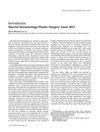 July 2023 in “Jurnal Ilmu Kesehatan Hewan”
July 2023 in “Jurnal Ilmu Kesehatan Hewan” Sulfur-based treatments combined with simparica effectively treat scabies in puppies.

Plant-based compounds can improve wound dressings and skin medication delivery.
 June 2021 in “CRC Press eBooks”
June 2021 in “CRC Press eBooks” Plant-based hair care products can effectively treat hair loss with fewer side effects than synthetic treatments, and more research is needed for their development.
 January 2020 in “Elsevier eBooks”
January 2020 in “Elsevier eBooks” Plant-based chemicals may help hair growth and prevent hair loss but need more research to compete with current treatments.
 January 2017 in “Lasers in Surgery and Medicine”
January 2017 in “Lasers in Surgery and Medicine” The 2017 issue emphasized progress in laser and energy-based skin treatments, but noted the need for more research on certain procedures and technologies.

Follicular unit grafting is a procedure used to treat hair loss, where small hair grafts are placed into the scalp, with future treatments likely to involve smaller incisions and cell-based therapies.
A new lipid-based formula using myristyl myristate can improve estradiol treatment for hair loss.

Some plant-based ingredients may help with hair growth and care, but more research is needed to confirm their effectiveness.

Treatments for hair loss vary, but cell-based options may be the future.
 378 citations,
November 2011 in “Human reproduction update”
378 citations,
November 2011 in “Human reproduction update” Experts recommend using evidence-based methods to diagnose and treat hirsutism, focusing on symptoms and underlying causes.
 59 citations,
February 2021 in “Advanced Functional Materials”
59 citations,
February 2021 in “Advanced Functional Materials” The silk fibroin-based hydrogel shows promise for treating melanoma and healing infected wounds by killing tumor cells and bacteria, and supporting skin recovery.
48 citations,
March 2005 in “PubMed” Some plant-based compounds might help control the growth of new blood vessels if further research confirms their effectiveness.
 43 citations,
February 2020 in “Clinica chimica acta”
43 citations,
February 2020 in “Clinica chimica acta” Nano-sized plant-based chemicals could improve cervical cancer treatment by being more effective and causing fewer side effects than current methods.
37 citations,
December 2005 in “International Journal of Clinical Practice” Choose acne treatments based on appearance, lesion type, severity, scarring, and mental impact.
22 citations,
September 2013 in “Science international” Leafy spices like basil and mint are very healthy and can help with digestion, hair loss, and inflammation.
18 citations,
April 1989 in “Clinics in Dermatology” The argon gas-based cryotherapy effectively reduced keloid scars but caused some hypopigmentation and had a recurrence rate, especially in Afro-American patients.
 15 citations,
October 2010 in “Archives of Toxicology”
15 citations,
October 2010 in “Archives of Toxicology” A yeast-based test can detect the steroid methyltestosterone in urine longer than traditional methods.
 12 citations,
September 2020 in “Stem cell research & therapy”
12 citations,
September 2020 in “Stem cell research & therapy” Adult skin cell-based early-stage skin substitutes improve wound healing and hair growth in mice.
 10 citations,
June 2019 in “International Journal of Cosmetic Science”
10 citations,
June 2019 in “International Journal of Cosmetic Science” Some plant-based chemicals may help with hair growth, but more research is needed to confirm their effectiveness.
 8 citations,
April 2023 in “Advanced materials”
8 citations,
April 2023 in “Advanced materials” Using blood-based implants improves skin healing and reduces scarring.
8 citations,
June 2021 in “Annals of internal medicine” Experts recommend a team-based approach to treat patients with long-lasting COVID-19 symptoms and emphasize the need for ongoing research.
 8 citations,
July 2012 in “Annals of biomedical engineering”
8 citations,
July 2012 in “Annals of biomedical engineering” Hair absorbs molecules differently based on their size, charge, and love for water, and less at higher pH; this can help make better hair products.
 6 citations,
April 2004 in “Journal of Enzyme Inhibition and Medicinal Chemistry”
6 citations,
April 2004 in “Journal of Enzyme Inhibition and Medicinal Chemistry” New progesterone-based compounds can block male hormones.
 5 citations,
September 2011 in “Bioorganic & Medicinal Chemistry Letters”
5 citations,
September 2011 in “Bioorganic & Medicinal Chemistry Letters” Pfizer found that pantolactam-based compounds can reduce sebum (skin oil) production when applied topically.
4 citations,
June 2022 in “Journal of food bioactives” Eating plant-based anti-inflammatories and antioxidants may help manage long-term COVID-19 health issues.

New treatments for hair loss, including a compound called "ALRV5XR", platelet-rich plasma, and Adult Stem Cell-based therapy, are showing promise, but more trials are needed for confirmation.
 2 citations,
April 2022 in “Clinical, cosmetic and investigational dermatology”
2 citations,
April 2022 in “Clinical, cosmetic and investigational dermatology” A new plant-based treatment was effective for hair regrowth in women with a specific type of hair loss that didn't respond to usual treatments.
2 citations,
January 2009 A natural extract-based hair growth product was developed and showed promise in preliminary tests.
 1 citations,
January 2023 in “Research Square (Research Square)”
1 citations,
January 2023 in “Research Square (Research Square)” A neem-based herbal treatment worked better than ivermectin for sarcoptic mange in camels, improving their recovery and overall health.
 1 citations,
December 2019 in “International journal of innovative technology and exploring engineering”
1 citations,
December 2019 in “International journal of innovative technology and exploring engineering” Fish scale-based organic hair oil and shampoo may improve hair health and prevent damage.






















